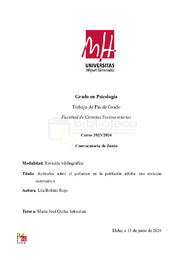Please use this identifier to cite or link to this item:
https://hdl.handle.net/11000/32474Full metadata record
| DC Field | Value | Language |
|---|---|---|
| dc.contributor.advisor | Quiles Sebastián, María José | - |
| dc.contributor.author | Bolaño Rojo, Lúa | - |
| dc.contributor.other | Departamentos de la UMH::Psicología de la Salud | es_ES |
| dc.date.accessioned | 2024-07-16T12:11:42Z | - |
| dc.date.available | 2024-07-16T12:11:42Z | - |
| dc.date.created | 2024-06 | - |
| dc.identifier.uri | https://hdl.handle.net/11000/32474 | - |
| dc.description.abstract | El poliamor es una relación no monógama consensuada que cada vez está más presente en la sociedad. El objetivo de este estudio es realizar una revisión bibliográfica para conocer las actitudes que tiene la población adulta sobre el poliamor. Para ello, se realizó una búsqueda de artículos en las bases de datos Scopus y Web of Science, seleccionando los que utilizaran la escala ATP (Attitudes Towards Polyamory), donde cumplieron los requisitos 6 artículos. Se tratan de estudios cuasiexperimentales y transversales de diferentes países que miden las actitudes hacia el poliamor y otras variables individuales mediante la ATP y otras escalas. Aunque la mayoría tenía actitudes positivas hacia el poliamor, no se pudo concluir si era representativo por el tamaño de las muestras y los sesgos. Sin embargo, se observó que las variables individuales de edad, valores y orientación sexual sí influían en las actitudes hacia el poliamor. | es_ES |
| dc.description.abstract | Polyamory is a consensual non-monogamous relationship that is increasingly present in society. The aim of this study was to carry out a literature review to determine the attitudes of the adult population towards polyamory. To this end, a search for articles was carried out in the Scopus and Web of Science databases, selecting those that used the ATP (Attitudes Towards Polyamory) scale, where 6 articles met the requirements. These were quasi-experimental and cross-sectional studies from different countries measuring attitudes towards polyamory and other individual variables using the ATP and other scales. Although the majority had positive attitudes towards polyamory, it could not be concluded whether it was representative because of sample sizes and biases. However, it was observed that the individual variables of age, values, and sexual orientation did influence attitudes towards polyamory. | es_ES |
| dc.format | application/pdf | es_ES |
| dc.format.extent | 26 | es_ES |
| dc.language.iso | spa | es_ES |
| dc.publisher | Universidad Miguel Hernández de Elche | es_ES |
| dc.rights | info:eu-repo/semantics/openAccess | es_ES |
| dc.rights | Attribution-NonCommercial-NoDerivatives 4.0 Internacional | * |
| dc.rights.uri | http://creativecommons.org/licenses/by-nc-nd/4.0/ | * |
| dc.subject | Poliamor | es_ES |
| dc.subject | relaciones no monógamas | es_ES |
| dc.subject | ATP | es_ES |
| dc.subject | actitudes hacia poliamor | es_ES |
| dc.subject | revisión sistemática | es_ES |
| dc.subject | Polyamory | es_ES |
| dc.subject | non monogamous relationships | es_ES |
| dc.subject | attitudes towards polyamory | es_ES |
| dc.subject | systematic review | es_ES |
| dc.subject.other | CDU::1 - Filosofía y psicología::159.9 - Psicología | es_ES |
| dc.title | Actitudes sobre el poliamor en la población adulta: una revisión sistemática | es_ES |
| dc.type | info:eu-repo/semantics/bachelorThesis | es_ES |

View/Open:
TFG Bolaño Rojo, Lúa.pdf
1,19 MB
Adobe PDF
Share:
Admin Tools
.png)
